|
|
|
Sort Order |
|
|
|
Items / Page
|
|
|
|
|
|
|
| Srl | Item |
| 1 |
ID:
144982
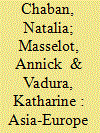

|
|
|
|
|
| Summary/Abstract |
This special issue sets out to explore the responses of norm-receivers to EU export of
norms and values. The main focus of this special issue is on the Asian recipients of EU
norms. The leading theoretical explanations—used by all contributors to this Issue—
are from the revisited analytical framework of ‘Normative Power Europe’ (NPE). NPE
is a popular conceptual paradigm that has informed debate about the EU since the early
2000s. Introduced in the seminal work by Ian Manners (2002), it remains a useful and
intellectually attractive model to understand the EU and its actions both internally and
externally. Its appeal lies in its emphasis on ideas; its open, eclectic and critical nature;
and its focus on explanations of power beyond state-centred models
|
|
|
|
|
|
|
|
|
|
|
|
|
|
|
|
| 2 |
ID:
144988
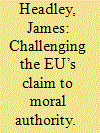

|
|
|
|
|
| Summary/Abstract |
Normative Power Europe is not just an academic concept: it is part of the self-understanding of many EU policymakers. They believe that the EU is setting standards of state behaviour in Europe and globally. The EU is regarded as an elaborator and epitomizer of European and ‘civilised’ values, as a model for other regions and states and as inherently an ethical actor. Russian policymakers reject these notions and, in doing so, increasingly accuse the EU of ‘double standards’, arguing that EU external action is inconsistent and does not always match its rhetoric; that the rhetoric therefore masks the pursuit of interests in its foreign policy; that the EU is like any other state (or state-like entity) and has no special claim to act ethically or to be a moral authority; and that internally, the EU does not live up to the values it seeks to impose on others. This article gives examples of Russian talk of EU double standards, analyses the motivations and assesses the likely impact. It argues that for such criticism to have any impact on EU policy, the critic must be seen as a moral equal, which the EU’s sense of moral superiority over Russia rules out.
|
|
|
|
|
|
|
|
|
|
|
|
|
|
|
|
| 3 |
ID:
169454
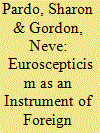

|
|
|
|
|
| Summary/Abstract |
This article advances three arguments about Euroscepticism. First, using Israel as a case study we describe its alliances with Eurosceptic political actors, claiming that while each side hopes to benefit from these alliances to advance particular interests, the attraction among the actors are based on ideological affinities that do not align with the norms informing EU policies. If these norms become more contested, it may make it more difficult to construct a ‘normative power’-based approach in EU foreign policy. Second, we reveal how third parties can use Euroscepticism as an instrument for shaping EU foreign policy. Finally, we expose how this strategy produces a political paradox. By allowing itself to become an instrument deployed by a third party, the Eurosceptic member state also agrees to be pushed back into the fold of the EU apparatus, thus reconstituting itself as an internal actor, one which has stakes in the process and is willing to play by the rules of the game.
|
|
|
|
|
|
|
|
|
|
|
|
|
|
|
|
| 4 |
ID:
189496


|
|
|
|
|
| Summary/Abstract |
The European Union's position on “one China” has stood since the establishment of diplomatic relations with the People's Republic of China (PRC) in 1975. As a union of distinct member states, the nature of the European Union's (EU) foreign policymaking complicates efforts to maintain coherent common positions. Its effective “one China policy” (and those of its member states) is no exception. In recent years, the edges of the bloc's long-standing policy have started to fray as the EU–PRC relationship has become more fraught and many member states have sought to deepen their effective, if “unofficial,” engagement with Taiwan. I explore these changes to the EU's effective “one China policy” by employing a subsystems framework, starting from the position that the EU has foreign policies (rather than a singular policy) created through three subsystems. Through the Normative Power Europe lens, I explore the extent to which the actors pulling at these “threads” at the edges of the EU's policy are motivated by normative concerns. I argue that the “fraying” of the EU's “one China policy” is not the result of a conscious decision by the EU as a collective normative actor but stems from shifting preferences within the national and supranational subsystems.
|
|
|
|
|
|
|
|
|
|
|
|
|
|
|
|
| 5 |
ID:
144989


|
|
|
|
|
| Summary/Abstract |
This paper revisits some methodological issues regarding the application of ‘normative power Europe’ (NPE) as an analytical tool. It looks at the descriptive, interpretive and prescriptive aspects of NPE and identifies ontological and epistemological problems, further normative theorising and the empirical (ir)relevance within the case of China. Central to this paper is the emphasis on how to critically apply the NPE approach to a cross-cultural context in which universalist versus relativist paradigm, interpretivist versus positivist approaches and different ethical judgments can be combined and bridged. This paper argues that NPE helps us understand the EU’s identity creation which can be translated in matching policy terms, either by design or default. Despite its descriptive credibility, the explanatory power of NPE has been limited not just by differences concerning fundamental values, but the need to engage China on normative issues through cooperation and dialogue, a form of normative action itself. The prescriptive value of NPE, nevertheless, should be promoted in both academic and policy debates by strengthening the clarity and consistency of how the EU conveys this self-perception to the others. Finally, the paper concludes that applying the NPE approach empirical research requires theory refinement and operationalisation of the concept uniquely tailored to the chosen empirical cases. As far as China is concerned, detailed case-by-case analyses within a longitudinal time frame—which allows sufficient space for investigators to develop depth in inter-paradigm and inter-disciplinary research—would be useful in highlighting the strength of the NPE approach.
|
|
|
|
|
|
|
|
|
|
|
|
|
|
|
|
| 6 |
ID:
149496
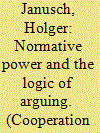

|
|
|
|
|
| Summary/Abstract |
The concept of Europe as a normative power can be understood as a theoretical attempt to define a new type of protagonist in world politics, distinct from older concepts such as empire, hegemonic power, or great power. Because many scholars have used universal norms as a criterion for ‘normative power Europe’, the concept is often criticized as hidden Eurocentrism, soft imperialism, or hegemony. In this article, a normative power is defined not by the universality of the norms it seeks to diffuse, but by the underlying logic according to which it acts. A normative power takes communicative actions and acts in accordance with the logic of arguing, not consequentialism. This definition of normative power escapes the trap of a hidden Eurocentric imperialism by abstracting the theoretical concept from the specific case of Europe and detaching it from the criterion of universal norms.
|
|
|
|
|
|
|
|
|
|
|
|
|
|
|
|
| 7 |
ID:
138764


|
|
|
|
|
| Summary/Abstract |
This article attempts to demonstrate the importance of the discursive context for whether and, if so, how the European Union (EU) can exert normative power in different policy areas. Surprisingly, the concept of power has not been extensively discussed in the academic literature on Normative Power Europe, with the notable exceptions of Diez (2013); Keene (2012); Forsberg (2011) and Huelss (2011) (who also discuss the meaning of the ‘normative’). Focusing on power, the question asked in this article is how the discursive context of the politics of religion affects the EU’s ability to exert normative power in this area. The article examines the politics of religion by looking at the case of the debate about human rights versus religion in the United Nations Human Rights Council after the year 2000. The broader point addressed in the article is whether the EU can exert normative power regardless of the discursive context of the policy area concerned.
|
|
|
|
|
|
|
|
|
|
|
|
|
|
|
|
| 8 |
ID:
159357


|
|
|
|
|
| Summary/Abstract |
The Euro, refugees, Brexit, thriving right-wing populism and time and again a lack of coherence and consistency in EU foreign policy, as in Iraq 2003 or in Libya in 2011—seem to point to the EU in crisis. The idea of normative power Europe (NPE) essentially entails that the EU has a transformative impact on international society also outside its own borders. In light of such developments, the question arises whether such a transformative impact still seems possible. Rather than dealing with all such different moments of crisis, this article focuses on an alleged EU foreign policy crisis and asks whether—as NPE sceptics argue—inconsistencies and a lack of coherence in EU foreign policy undermines the idea of a transformative agenda and thus puts NPE to crisis. This article introduces the concept of ambiguity as a particular way of studying NPE. Ambiguity in this sense is an inevitable feature of the social world—of the EU as a global actor and of processes of change. Thus, the argument is put forward that ambiguity does not necessarily impinge on the EU’s transformative agenda. Rather than being an indication of a foreign policy crisis, the ambiguous nature of the EU and resulting ambiguous policies actually do underpin the EU’s transformational potential.
|
|
|
|
|
|
|
|
|
|
|
|
|
|
|
|
| 9 |
ID:
146004
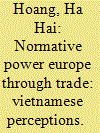

|
|
|
|
|
| Summary/Abstract |
This article considers the perception of Normative Power Europe (NPE) through the eyes of Vietnam, measuring the degree to which an actor can successfully pursue a normative foreign policy. This article attempts to demonstrate that discussion on the European Union’s (EU) normative identity should include an investigation into the external perceptions of the EU. To become an NPE, the EU’s external partners should recognise it as a holder of norms and values, appreciate its role as a norm-diffuser and perceive the attractiveness of its norms. Semi-structured interviews were conducted with Vietnamese government officials with professional experience in the field of trade relations with the EU to assess non-EU state elites’ perceptions of the EU’s identity. Vietnam’s policy-makers tend to acknowledge the norms that constitute the EU’s normative foundation, with particularly high consensus on those concerning economic liberalism. The EU’s economic and social norms are to some extent attractive for Vietnam and thus able to be adopted and adapted to the Vietnamese context.
|
|
|
|
|
|
|
|
|
|
|
|
|
|
|
|
| 10 |
ID:
120739


|
|
|
|
|
| Publication |
2013.
|
| Summary/Abstract |
Who or what is a normative power? In response to this query the article suggests that normative powers are those actors that are recognized as such by others. This qualifies Ian Manners's oft-quoted proposition that normative powers are only those actors that have the ability to 'shape what can be "normal" in international life'. The proposition is that the definitions of the 'normal' are not merely undertaken by normative power, but they emerge in the context of its interaction with others. Recognition, in this setting, is indicated by the specific reactions of target states. In this respect, the issue is not merely about being and becoming a normative power, but also about being recognized as one by others. The article details this proposition through a parallel assessment of normative power Europe and normative power China. The intention of such comparison is to elicit the key elements of normative power in global life.
|
|
|
|
|
|
|
|
|
|
|
|
|
|
|
|
| 11 |
ID:
138321


|
|
|
|
|
| Summary/Abstract |
In October 2014, Sweden’s new left-wing government became the first member of the European Union (EU) to recognize the State of Palestine. Previously, Malta and Cyprus had recognized Palestine, but that was before they joined the EU. In addition, a number of Central European member states have also recognized Palestine when they were part of the Soviet Union. It is a bit unclear what the status of their recognitions is today, as some of these states (the Czech Republic in particular) have emerged as Israel’s closest allies in Europe.
|
|
|
|
|
|
|
|
|
|
|
|
|
|
|
|
| 12 |
ID:
144987


|
|
|
|
|
| Summary/Abstract |
This analysis tackles a previously understudied topic—the ebb and flow of ideas towards the European Union (EU) as a ‘Normative Power’ found in an external society. It asks three questions. How can particular visions about a foreign policy actor—the EU in our case—be activated and disseminated in societies beyond the Union’s borders? Who are the key local actors who facilitate the spreading of these ideas? And how might the personal views towards the EU and its ‘Normative Power (NPE)’ identity of these key actors influence the activation of ‘NPE’ ideas in a given society? In answering these questions, this analysis brings together two theoretical models previously not linked—the NPE analytical approach (Manners, J Common Mark Stud 40(2):235–258, 2002) and the ‘cascading activation’ framing theory (Entman, Polit Commun 20(4):415–432, 2003, 2004). Empirically, this paper employs data from 74 face-to-face semi-structured interviews on the perceptions of the EU as a normative power. Interviews were held among the leading newsmakers from influential national media—news writers (journalists, columnists, reporters) and media gatekeepers (editors, news directors, publishers and news producers) from seven Asian countries.
|
|
|
|
|
|
|
|
|
|
|
|
|
|
|
|
| 13 |
ID:
107618
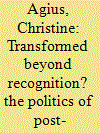

|
|
|
|
|
| Publication |
2011.
|
| Summary/Abstract |
The transition from neutrality to post-neutrality has been debated by constructivists and rationalists alike as a seemingly logical and unproblematic move: the end of the Cold War and the widening of the security agenda in a globalizing world have meant that a state-centric approach to security is no longer viable or desirable. The former neutrals are subsequently reconfiguring their security policies to reflect this development and contributing to European and NATO security initiatives, and at the same time contributing their own unique 'soft security' experiences and practices. This article aims to problematize this seemingly smooth move from neutrality to post-neutrality by examining the discourses deployed to facilitate this change. Arguing that there is a politics of post-neutrality at work, it draws attention to how identity is being reconstituted in the process of European integration and identity-formation, and how discourses on changing forms of security cooperation are facilitating the discursive dissemination of an inevitable logic that neutrality in any form will eventually be abandoned.
|
|
|
|
|
|
|
|
|
|
|
|
|
|
|
|
| 14 |
ID:
184114


|
|
|
|
|
| Summary/Abstract |
The concept of Normative Power Europe (NPE) has sparked widespread debate over the EU’s external relations and its role in world politics. Whist the EU studies community has engaged with the NPE literature and studied EU norm-entrepreneurship at theoretical and empirical levels, the NPE literature suffers from two major shortcomings: first, it falls short in uncovering the multifaceted nature of EU diffusion objects across different policy areas; second, the effectiveness of EU norm diffusion remains underexplored. To remedy these limitations, this article aims to provide a more nuanced understanding of the EU’s projection of normative power by drawing on analytical tools from diffusion literature. By doing so, this research argues that the EU’s projection of normative power in relation to other international actors can be conceptualised as a process of diffusion of EU norm-clusters in various policy areas. It also reconceptualises the impact of the EU’s normative power as varying diffusion outcomes. By undertaking an empirical case study of the EU–ASEAN security cooperation, this research adopts the analytical framework to unpack the EU’s projection of normative power and diffusion of security-related norm-cluster in relation to ASEAN.
|
|
|
|
|
|
|
|
|
|
|
|
|
|
|
|
|
|
|
|
|